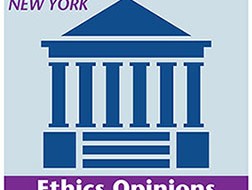Time-Barred Counterclaim in Lawyer’s Suit for Fees
By Lazar Emanuel [Originally published in NYPRR November 2002]
Attorney Jay Landa represented clients Margaret and Patrick Mullen in a Family Court proceeding in 1997 and 1998. A dispute developed concerning Landa’s fees. Landa complied with the provisions of NYCRR §136.5 requiring notice by certified mail of the clients’ right to arbitration of the fee dispute, but the clients failed to elect arbitration within the required thirty-day period following notice, and Landa commenced an action on his past-due account for services. Defendants asserted a counterclaim for professional negligence and malpractice and Landa moved for summary judgment. [Landa v. Mullen, Nassau Cty. District Ct., Oct. 2002.]
District Court Judge Scott Fairgrieve granted Landa’s motion for summary judgment on the account stated. The court found that Landa had submitted his bill, that the defendants had made a payment on account of the bill (i.e., the retainer), that the defendants had not contested Landa’s bill, and that, therefore, the defendants had accepted the bill.
Turning to the defendants’ claim for negligence and malpractice, Judge Fairgrieve found that the claim was time- barred under the applicable three-year statute of limitations. As such, the claim could not be the basis for affirmative relief. “However, when a plaintiff subjects himself to the jurisdiction of the court to resolve a dispute, counterclaims that arose from the same transaction or occurrence may be used to offset the plaintiff’s demands even after the statute of limitations bars the counterclaim.” [Citing Darby & Darby. P.C. v. VSI Intern. Inc., 95 N.Y.2d 308, in which the Court held that a time- barred counterclaim for malpractice did not grow out of the same transaction for which the attorneys were hired.]
Here, the counterclaim clearly relates back to the services performed by Attorney Landa. The defendants allege Landa’s negligence in representing Margaret Mullen in a claim by a third party for visitation rights to a child born in a relationship by the third party with Mrs. Mullen. The negligence claimed is that Landa failed to introduce evidence of felony convictions of the third party which went to his credibility and might have influenced the decision of the Family Court. Evidence of a criminal conviction may be introduced in a civil action for purposes of impeachment.
Judge Fairgrieve was unable to decide as a matter of law that the defendants were not damaged by Landa’s alleged malpractice. The judge therefore stayed entry and enforcement of the judgment for Landa pending his determination of the defendants’ counterclaim.
Lazar Emanuel is the Publisher of NYPRR.
DISCLAIMER: This article provides general coverage of its subject area and is presented to the reader for informational purposes only with the understanding that the laws governing legal ethics and professional responsibility are always changing. The information in this article is not a substitute for legal advice and may not be suitable in a particular situation. Consult your attorney for legal advice. New York Legal Ethics Reporter provides this article with the understanding that neither New York Legal Ethics Reporter LLC, nor Frankfurt Kurnit Klein & Selz, nor Hofstra University, nor their representatives, nor any of the authors are engaged herein in rendering legal advice. New York Legal Ethics Reporter LLC, Frankfurt Kurnit Klein & Selz, Hofstra University, their representatives, and the authors shall not be liable for any damages resulting from any error, inaccuracy, or omission.
Related Posts
« Taking Security Interest to Secure Payment of Fees ABA Issues Opinion on Will Drafting »







